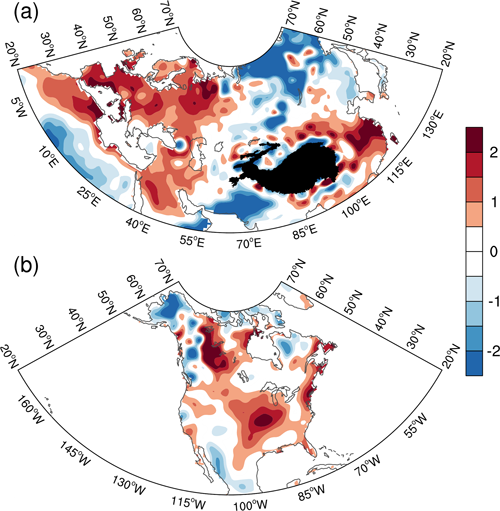The summer of 2022 brought extreme heat over most of the Eurasian continent and North America. This abnormal warming led to extraordinarily long-lasting extreme heat waves, especially in Europe and China. Because of this extreme heat, a research team has undertaken a review of the recent achievements in the study of heat waves.
To better understand the research that has been undertaken related to heat waves, the research team chose three journals – Advances in Atmospheric Sciences, Journal of Climate, and Climate Dynamics – and searched for articles whose titles contained "extreme heat/temperature" or "heat wave/heatwave." They focused their search on the years 1989 to 2021, breaking that time period up into three 11-year subperiods.
The amount of extreme heat-related papers in these three journals they studied has been growing during the past few decades. Since the total amounts of published papers has also been growing remarkably during this time period, the team tabulated the number to reflect the proportions of extreme heat-related papers to all published articles in each journal too. They found that the ratios have increased significantly in all three journals, especially in the most recent subperiod of 2011 to 2021. During this most recent subperiod, the proportions of literature related to extreme heat tripled, compared with the former subperiod. The team's findings show that extreme heat events have become an important public concern, with more and more research focused on the topic.
The heat waves that occurred during the summer of 2022 had far-reaching impact. The extreme temperatures were accompanied by droughts that severely affected Europe and the Yangtze River basin in China. These droughts affected hydro power and led to power shortages in some areas. The extremely high temperatures and severe drought also contributed to massive wildfires in Europe, North America, and Asia.
Scientists attribute the heat wave and drought in the Yangtze River basin to unusual atmospheric circulations. "However, the reason for the long-lasting extraordinary atmospheric circulations in summer 2022 is an interesting scientific issue and requires investigation," said LU Riyu, a researcher with the Chinese Academy of Sciences.
In addition to the unusual atmospheric circulations, climate change is also a contributing factor for the heat waves. Researchers have suggested that the very high temperatures the United Kingdom during the 2022 summer would have been extremely unlikely had it not been for human-induced climate change. More and more research seems to point to human activities as contributing to the unusual heat waves in many areas of the world.
For humans, the prolonged exposure to heat waves could lead to illnesses such as heat cramp, heat exhaustion, and heat stroke. The heat waves also make humans more vulnerable to cardiovascular and respiratory diseases. These diseases can lead to increased deaths, especially among the elderly.
Normalized 2-m maximum temperature anomalies averaged during June to August 2022 over (a) Eurasia and (b) North America. (Image by LU Riyu)
The extreme heat also has a negative impact on the environment. The high temperatures decrease photosynthesis and increase vegetation respiration. This causes a reduction in the amount of carbon stored in ecosystems. Heat waves increase wildfires, further contributing to the reduction in carbon.
"Various issues regarding heat waves remain to be further investigated, although the amounts of relevant papers have increased rapidly in the scientific literature during the past three decades," said Lu. "These issues include, but are not limited to, the mechanism responsible for formation of heat waves, the impacts of extreme heat on human health and terrestrial ecosystems, and extreme heat in sparsely populated areas of the world."
Looking ahead, the research team believes that the research related to heat waves must continue. "Heat waves will occur more and more frequently under the global warming, and some of them are expected to be unprecedented like those in summer 2022. Therefore, a better understanding of heat waves and their impacts is urgent and necessary," said LU.
The research team includes Riyu Lu, Ke Xu, Wei Chen, Fang Li, and Chenyu Lv from the Institute of Atmospheric Physics, Chinese Academy of Sciences, and the University of Chinese Academy of Sciences; and Ruidan Chen from the School of Atmospheric Sciences, Sun Yat-sen University, and Southern Marine Science and Engineering Guangdong Laboratory (Zhuhai).
The research is funded by the Second Tibetan Plateau Scientific Expedition and Research (STEP) program.
Media contact: Ms. LIN Zheng, jennylin@mail.iap.ac.cn
Reference: R. Lu, K. Xu, R. Chen et al., Heat waves in summer 2022 and increasing concern regarding heat waves in general, Atmospheric and Oceanic Science Letters, https://doi.org/10.1016/j.aosl.2022.100290

